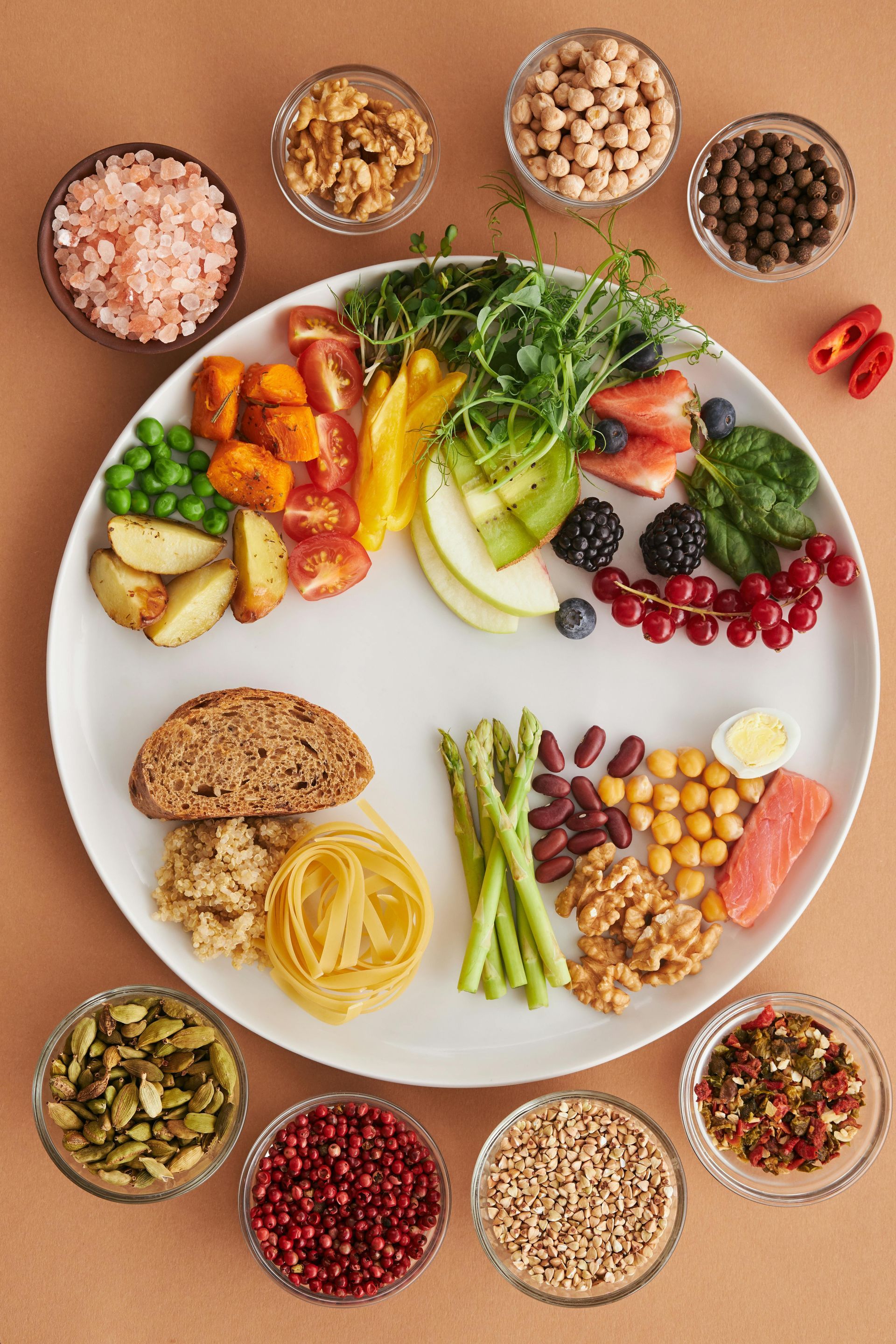How to Cook Vegan in a Mixed-Diet Household Without Extra Work

Tips on How to Cook Vegan in a Mixed-Diet Household
If you're vegan cooking mixed diet household meals every single night, you know the exhaustion that comes with trying to please everyone while staying true to your plant-based values.
Here's what most people don't realize: Research shows that vegetarian and vegan diets are often regarded as inconvenient and difficult to prepare, but this perception creates unnecessary stress in mixed diet household meal planning. The truth is you don't need to become a short-order cook or compromise your beliefs to keep everyone happy and well-fed.
The secret isn't making separate meals, it's mastering the art of strategic meal building that naturally accommodates everyone's preferences. Voila!
Here's what you'll discover in this comprehensive guide:
- Proven strategies time-saving vegan cooking without making separate meals
- Crowd-pleasing recipes that satisfy both vegans and meat-eaters
- Smart kitchen systems that eliminate double prep work
- Communication techniques that reduce family food conflicts
- Budget-friendly approaches to mixed diet family cooking tips
- Meal planning frameworks that work for diverse dietary needs
Ready to transform dinner time from a battleground into a peaceful gathering? Keep reading these game-changing strategies.
Why Mixed Diet Household Cooking Stress Happens (And How to Fix It)
The Hidden Psychology Behind Vegan Cooking Family Resistance
Let's address the elephant in the room: meat eater won't try vegan food isn't usually about the food itself. Research from European consumer studies reveals that major barriers to plant-based eating include expectations that plant-based foods won't be tasty enough and previous negative experiences that cause bias.
Understanding this psychology is your first step toward cooking vegan without complaints. When family members resist plant-based meals, they're often responding to:
- Fear of unfamiliar ingredients or cooking methods
- Concerns about feeling hungry or unsatisfied
- Past experiences with poorly prepared plant-based dishes
- Social conditioning about what constitutes a "complete" meal
The solution isn't to sneak vegetables into meals or argue about ethics. No, it's to create genuinely satisfying dishes that happen to be plant-based.
You May Also Like:
How to Deal with Vegan Social Pressure at Family Dinners
The Real Cost of Cooking Two Separate Meals Vegan Style
Before we dive into solutions, let's acknowledge the toll that accommodating everyone takes:
- Time: Double prep work can add 30-45 minutes to cooking
- Money: Buying ingredients for multiple meal types increases grocery bills by 40-60%
- Mental energy: Planning separate menus creates decision fatigue
- Kitchen space: More dishes, more cleanup, more chaos
- Family harmony: Resentment builds when one person becomes the family's short-order cook
The Foundation: Plant Based Cooking Shared Kitchen Setup for Success
Essential Tools for Vegan Omnivore Household Cooking
Let's start with setting up your kitchen for success. These tools make mixed household cooking shortcuts doable:
1. Large Cast Iron Skillet or Sheet Pan. The Lodge Cast Iron Skillet (12-inch) allows you to cook base ingredients together, then customize final dishes. Perfect for building vegan meals everyone will eat.
2. Multiple Cutting Boards. Keep plant-based prep clean with dedicated boards. The Bamboo Cutting Board Set includes color-coded boards for different ingredients.
3. High-Quality Blender for Versatile Sauces. The NutriBullet Pro 900 creates creamy sauces that transform simple ingredients into crowd pleasing vegan recipes.
Strategic Kitchen Organization for Mixed Diet Family Cooking Tips
Zone-Based Setup:
- Prep zone: Vegetables, grains, legumes (everyone uses)
- Protein zone: Plant-based proteins, with space for others if needed
- Sauce station: Multiple flavor profiles to customize basic ingredients
- Assembly area: Where individual plates get customized
This organization eliminates the chaos.
The Game-Changing Strategy: Build-Your-Own Meal Systems
The Foundation Method for Vegan Meals for Mixed Diet Family
Instead of making separate meals, create meal components that everyone can customize. This approach eliminates mixed diet household meal planning stress while ensuring everyone gets what they want.
The Universal Meal Formula: Base + Protein + Vegetables + Sauce + Toppings = Customized Satisfaction
Example: Taco Tuesday Made Easy
- Base: Cilantro lime rice and black beans (vegan)
- Proteins: Seasoned lentil "meat" (vegan) + space for others to add their preferences
- Vegetables: Roasted peppers, onions, fresh salsa
- Sauces: Cashew crema, guacamole, hot sauce
- Toppings: Fresh cilantro, lime wedges, pickled jalapeños
Everyone builds their perfect taco, but 90% of the work creates the vegan base that satisfies everyone.
TIP: Use the AI Vegan Meal Planner to create quick and easy recipes using the groceries you already have in your pantry or on your grocery list.
What Vegan Meals Will Meat Eaters Enjoy? The Science of Satisfaction
The key to plant based meals that satisfy meat eaters lies in understanding what creates meal satisfaction:
Umami-Rich Ingredients:
- Mushrooms (especially shiitake and cremini)
- Nutritional yeast
- Miso paste
- Soy sauce or tamari
- Sun-dried tomatoes
Texture Variety:
- Crispy elements (roasted chickpeas, toasted nuts)
- Creamy components (avocado, tahini dressings)
- Chewy proteins (well-seasoned tempeh or seitan)
Familiar Flavor Profiles:
- Italian: Garlic, basil, oregano, balsamic
- Mexican: Cumin, chili, lime, cilantro
- Asian: Ginger, sesame, rice vinegar, scallions
- American comfort: Herbs, hearty vegetables, satisfying carbs
12 Crowd Pleasing Plant Based Meals That End Food Fights
Category 1: Comfort Food Vegan Mixed Family Favorites
1. The Ultimate Veggie-Loaded Pasta Bar
Cook a large pot of pasta and create a toppings station:
- Vegan base: Marinara with hidden vegetables (carrots, zucchini, bell peppers blended in)
- Proteins: Lentil "meatballs," roasted chickpeas, hemp seeds
- Toppings: Fresh basil, nutritional yeast, garlic bread
- Customization space: Family members can add their preferred proteins
Why it works: Everyone recognizes pasta as comfort food, and the vegetable-heavy marinara tastes rich and satisfying.
2. Build-Your-Own Buddha Bowl Station Base ingredients (prep once, serve all week):
- Quinoa and brown rice blend
- Roasted sweet potato and broccoli
- Massaged kale salad
- Proteins: Baked tofu, seasoned tempeh, hemp hearts
Sauce variety:
- Tahini dressing
- Peanut sauce
- Balsamic vinaigrette
- Avocado lime crema
3. Hearty Chili That Converts Skeptics Secret
Three types of beans plus bulgur wheat create a meaty texture
- Kidney beans, black beans, pinto beans
- Bulgur wheat (adds substance)
- Fire-roasted tomatoes
- Umami boosters: Soy sauce, tomato paste, smoked paprika
Toppings bar: Avocado, cilantro, cashew sour cream, cornbread
Category 2: Quick Vegan Meals for Mixed Families
4. 20-Minute Stir-Fry System The formula: Protein + vegetables + sauce + grain = satisfied family
Prep Sunday: Cut all vegetables, cook grains, make 3 different sauce bases
Weeknight execution: 5 minutes of cooking, endless combinations
Base vegetables (universally loved): Bell peppers, snap peas, carrots, broccoli
Quick proteins: Pre-baked tofu cubes, edamame, cashews
5. Sheet Pan Dinners for Mixed Household Cooking Solutions
Everything roasts together at 425°F:
- Foundation: Root vegetables (potatoes, carrots, onions)
- Proteins: Chickpeas, cubed tempeh, or marinated tofu
- Flavor makers: Fresh herbs, lemon, quality olive oil
The magic: One pan, minimal cleanup, maximum satisfaction
6. Breakfast-for-Dinner Hits Pancake Bar Setup:
- Fluffy vegan pancakes (no one will know the difference)
- Toppings: Fresh berries, maple syrup, nut butter, coconut whip
- Protein sides: Tempeh "bacon," fruit salad, smoothie shots
Category 3: Vegan Food That Doesn't Taste Vegan
7. "Meaty" Mushroom and Lentil Bolognese
The secret sauce: Finely diced mushrooms + green lentils + umami boosters
- Use food processor to create ground "meat" texture
- Slow simmer develops deep flavors
- Serve over pasta or polenta
8. Loaded Baked Potato Bar Universal base: Perfectly baked potatoes
Vegan toppings that satisfy everyone:
- Cashew sour cream
- Steamed broccoli and nutritional yeast
- Chili and avocado
- Mushroom "bacon" bits
9. Pizza Night Success Strategy Base
Homemade or quality store-bought dough Universal appeal toppings:
- Caramelized onions and mushrooms
- Fresh tomatoes and basil
- Roasted vegetables
- Cheese alternatives: Cashew mozzarella or nutritional yeast blend
How Do You Cook for Vegan and Meat Eaters? The Practical Systems
The 80/20 Rule for Mixed Diet Meal Prep Strategies
80% shared preparation: Base ingredients, vegetables, grains, sauces
20% customization: Final protein additions or specific preferences
This approach eliminates vegan cooking accommodation challenges while keeping everyone satisfied.
Sunday Prep Session (90 minutes total):
- Cook 3 cups mixed grains (quinoa, brown rice, farro)
- Roast 2 sheet pans of mixed vegetables
- Prepare 3 versatile sauces
- Prep proteins: marinated tofu, seasoned lentils, roasted chickpeas
Weeknight execution (15-20 minutes):
- Reheat base ingredients
- Customize with different sauces and toppings
- Add fresh elements (herbs, avocado, nuts)
Smart Shopping for Mixed Household Cooking Without Separate Prep
Strategic grocery approach:
- Focus on whole food ingredients that everyone recognizes
- Buy vegetables in bulk (they're the foundation of every meal)
- Invest in quality spices and sauces for flavor variety
- Stock pantry with versatile proteins (beans, lentils, quinoa)
Budget-friendly sources:
Thrive Market offers wholesale prices on organic, plant-based ingredients that create satisfying meals for mixed households.
Instacart partnerships with stores like Whole Foods make it easy to get specialty ingredients without extra shopping trips.
Navigating Plant Based Cooking Family Pushback with Emotional Intelligence
Communication Strategies That Actually Work
Instead of: "This is healthier for everyone"
Try: "I found this amazing recipe that reminded me of [familiar dish]"
Instead of: "You need to try more vegetables"
Try: "What flavors do you really love? Let me work with those"
Instead of: "This is better for the environment"
Try: "This tastes incredible, want to see how I made it?"
The Vegan Recipes Non Vegans Will Love Psychology
Start with familiar formats:
- Pasta dishes (everyone loves pasta)
- Stir-fries (quick, customizable, satisfying)
- Soups and stews (comfort food appeal)
- Grain bowls (build-your-own excitement)
Gradually introduce new ingredients:
- Week 1: Add nutritional yeast to pasta (tastes like parmesan)
- Week 2: Include tahini in salad dressings (creamy and rich)
- Week 3: Try tempeh "bacon" in breakfast dishes
- Week 4: Experiment with cashew cream in soups
What Vegan Dishes Satisfy Meat Eaters? The Ultimate Recipe Collection
Protein Rich Vegan Mixed Family Powerhouses
Triple-Bean Power Chili: Serves 6-8, prep time: 15 minutes, cook time: 45 minutes
Why it works: Three types of beans plus bulgur create a satisfying, protein-rich base that even dedicated meat-eaters find filling.
Base ingredients:
- 1 cup each: kidney beans, black beans, pinto beans (canned for convenience)
- 1 cup bulgur wheat (the secret texture ingredient)
- 2 cans fire-roasted tomatoes
- 2 bell peppers, 1 large onion, 3 cloves garlic
Umami boosters:
- 2 tbsp tomato paste
- 1 tbsp soy sauce
- 2 tsp smoked paprika
- 1 tsp liquid smoke
The method:
- Sauté onions and peppers until caramelized
- Add garlic, tomato paste, and spices—cook until fragrant
- Add bulgur, beans, tomatoes, and liquid
- Simmer 30 minutes until bulgur is tender and flavors meld
Serving strategy: Create a toppings bar with avocado, cilantro, cashew sour cream, and cornbread. Let everyone customize their bowl.
Meat Free Meals Everyone Enjoys: The Comfort Food Edition
Mushroom and Lentil "Meatballs" Makes 20 meatballs, perfect for pasta night
The secret: Food processors create the perfect texture that mimics traditional meatballs.
Ingredients:
- 1 cup cooked green lentils
- 8 oz mushrooms (cremini or shiitake), finely chopped
- 1/2 cup rolled oats, ground into flour
- 2 tbsp ground flaxseed mixed with 6 tbsp water
- Seasonings: garlic, Italian herbs, nutritional yeast
Why everyone loves them: They're savory, satisfying, and have the exact texture people expect from meatballs.
Balanced Vegan Meals Mixed Household Nutrition Planning
Ensuring Complete Nutrition Plant Based Omnivore Meals
The plate method for mixed families:
- 1/2 plate: Colorful vegetables (aim for 3+ colors)
- 1/4 plate: Complex carbohydrates (quinoa, brown rice, sweet potatoes)
- 1/4 plate: Plant proteins (beans, lentils, tofu, tempeh, nuts)
- Healthy fats: Avocado, olive oil, nuts, seeds
Key nutrients to prioritize in healthy vegan cooking shared kitchen:
- Protein: Combine legumes with grains for complete amino acids
- Iron: Pair iron-rich foods (spinach, lentils) with vitamin C (tomatoes, peppers)
- B12: Nutritional yeast, fortified plant milks (important for everyone, not just vegans)
- Omega-3s: Chia seeds, flax seeds, walnuts
Nutritious Mixed Household Cooking That Satisfies Everyone
Weekly nutrition template:
- Monday: Legume-based meal (chili, curry, or stew)
- Tuesday: Whole grain focus (Buddha bowls, grain salads)
- Wednesday: Vegetable-forward (stir-fries, roasted vegetable medleys)
- Thursday: Comfort food (pasta, pizza, hearty soups)
- Friday: Quick assembly meals (wraps, grain bowls)
- Weekend: Experiment with new recipes or family favorites
Technology and Tools for Modern Mixed Household Cooking Solutions
Apps for Plant Based Mixed Family Meal Planning
Vegan Meal Planner uses AI to suggest recipes based on ingredients you already have or are on your grocery list. It is perfect for creating vegan dishes everyone enjoys without food waste.
Mealime allows you to set dietary preferences for different family members and creates shopping lists for mixed diet family cooking.
Kitchen Gadgets That Eliminate Vegan Cooking Extra Work
Instant Pot Duo 7-in-1
Perfect for mixed household cooking shortcuts:
- Cook grains and legumes quickly
- Steam vegetables while proteins cook below
- Make large batches for meal prep
- One-pot meals that satisfy everyone
Food Processor for Texture Magic
The Cuisinart Elemental 8-Cup transforms:
- Cashews into cream sauces
- Mushrooms into "meat" texture
- Vegetables into hidden nutrition boosters
- Nuts into quick protein additions
Seasonal Mixed Diet Household Strategies
Holiday Mixed Diet Family Cooking Without the Stress
Thanksgiving approach:
- Traditional sides that happen to be vegan: roasted vegetables, cranberry sauce, herb stuffing
- Centerpiece options: Stuffed acorn squash, lentil Wellington, mushroom roast
- Strategy: Focus on abundance rather than substitution
Summer grilling solutions:
- Portobello mushroom "steaks"
- Vegetable kabobs with protein-rich marinades
- Black bean burgers that satisfy meat-lovers
- Grilled fruit for dessert
Comfort Food Vegan Omnivore Family Winter Warmers
Hearty soups and stews are natural crowd-pleasers:
- Minestrone with white beans and pasta
- Split pea soup with smoked tempeh
- Butternut squash and coconut curry
- Lentil and vegetable shepherd's pie
Troubleshooting Common Mixed Household Cooking Challenges
"The Kids Won't Eat Anything Green"
Strategy: Start with familiar flavors in new formats
- Green smoothies disguised as "superhero drinks"
- Spinach mixed into familiar pasta sauces
- Broccoli roasted with garlic until crispy
- Peas added to fried rice or grain bowls
Key insight: Don't make vegetables the main event initially—incorporate them into loved dishes.
"My Partner Says They Need Meat to Feel Full"
Solution: Focus on protein rich vegan mixed family meals that emphasize satiety
- Include 20+ grams of plant protein per meal
- Add healthy fats (avocado, nuts, seeds)
- Choose complex carbohydrates over simple ones
- Include umami-rich ingredients for satisfaction
"Vegan Ingredients Are Too Expensive for Our Budget"
Budget-friendly mixed diet family cooking tips:
- Buy beans and lentils in bulk
- Focus on seasonal vegetables
- Use frozen vegetables strategically
- Make large batches and freeze portions
- Shop at stores like Aldi or Costco for bulk plant proteins
Creating Your Personal Mixed Household Meal Planning System
Week 1: Foundation Building
- Inventory current family preferences
- Identify 5 meals everyone already enjoys that are vegan or easily adapted
- Master one "build-your-own" meal system
- Establish shopping and prep routines
Week 2: Expansion and Testing
- Introduce 2 new recipes using familiar flavors
- Practice batch cooking techniques
- Refine your customization stations
- Get family feedback and adjust
Week 3: System Optimization
- Perfect your meal prep timing
- Fine-tune portion sizes and preferences
- Build confidence in improvisation
- Create backup plans for busy nights
Week 4: Long-term Sustainability
- Establish seasonal menu rotations
- Build a repertoire of go-to meals
- Create systems for trying new recipes
- Develop strategies for special occasions
Expert Mixed Diet Household Cooking Success Stories
Real Family Transformations
The Martinez Family: "We went from cooking 2-3 separate meals every night to one base meal that everyone customizes. Our grocery bill dropped by $150/month, and dinnertime stress disappeared. The kids actually ask for 'more of those crispy chickpeas' now!"
Sarah and Mike: "My husband was the ultimate meat-and-potatoes guy. By starting with hearty, familiar flavors and gradually expanding, he now prefers our plant-based chili to any meat version. The key was never making him feel wrong about his preferences."
The College House: "Five roommates with different diets seemed impossible until we learned the component method. Now we split grocery costs, prep base ingredients together, and everyone gets exactly what they want. It's actually brought us closer as friends."
Your Plant Based Mixed Household Action Plan
This Week: Foundation Setup
- Audit your current cooking routine: What's working? What creates stress?
- Choose 3 "build-your-own" meal systems from this guide to try
- Set up your kitchen with dedicated prep zones
- Have a family conversation about preferences and goals (without judgment)
Next Week: Implementation and Testing
- Try 2 new recipes from the comfort food section
- Practice meal component prep for one full week
- Track what works and what needs adjustment
- Get family feedback and make modifications
Month 1 Goal: Sustainable Harmony
Establish a routine where cooking vegan mixed diet household meals feels natural, saves time, and keeps everyone satisfied. Success looks like:
- Reduced cooking time and cleanup
- Less food waste and lower grocery bills
- Decreased mealtime conflicts
- Increased vegetable consumption for everyone
- Maintained or improved family satisfaction with meals
Bottom Line: Transform Your Mixed Diet Household Cooking Starting Tonight
You now have the complete roadmap for cooking vegan in mixed family harmony without the stress, extra work, or food fights. The secret was never about converting anyone or making separate meals. It's about creating abundant, satisfying food that naturally brings everyone together.
Start small tonight: Choose one build-your-own meal system from this guide and watch how it transforms not just dinner, but your entire family dynamic around food. When cooking becomes collaborative rather than confrontational, everyone wins.
Remember: The goal isn't to make everyone vegan, it's to create a peaceful, nourishing environment where plant-based eating can thrive alongside family harmony. These strategies work because they honor everyone's preferences while gently expanding comfort zones.
Love what you read? Check out The Busy Vegan Blog and join our email list for more articles with practical solutions for the unique challenges vegans face delivered straight to your inbox.

Frequently Asked Questions About Cooking Vegan in a Mixed-Diet Household
How can I cook vegan in a mixed diet household without making separate meals?
Focus on build-your-own meal systems where you prepare base ingredients (grains, roasted vegetables, beans) that everyone can customize. Create component-based meals like taco bars, Buddha bowl stations, or pasta with multiple sauce and topping options. This approach eliminates duplicate work while satisfying different preferences.
What vegan meals will meat eaters actually enjoy and request again?
Comfort food classics adapted with plant-based ingredients work best: hearty chili with three types of beans, "meaty" mushroom and lentil bolognese, loaded baked potato bars, and build-your-own pizza nights. The key is focusing on familiar flavors and satisfying textures rather than obviously "healthy" dishes.
How do I handle family members who refuse to try vegan food?
Start with familiar formats and don't label meals as "vegan." Instead, focus on taste: "I made this amazing pasta sauce" rather than "this is a vegan marinara." Gradually introduce plant-based elements into beloved dishes, and always provide customization options so no one feels forced.
Can I really save money cooking vegan for a mixed diet family?
Yes! Plant proteins cost 60-80% less than meat, and bulk buying beans, lentils, and grains creates substantial savings. Focus on seasonal vegetables, batch cooking, and minimal food waste. Many families save $100-200 monthly by emphasizing plant-based meals while still accommodating everyone's preferences.
How do I meal prep for different dietary needs in one household?
Use the component method: prep base ingredients (grains, roasted vegetables, proteins) that work for everyone, then create customization stations. Cook once, eat multiple ways. Batch cook on weekends, store components separately, and let family members assemble their preferred combinations throughout the week.
What kitchen tools make cooking for mixed diets easier?
Essential tools include a large cast iron skillet for one-pan meals, multiple cutting boards for clean prep, a high-speed blender for versatile sauces, and glass storage containers for component storage. An Instant Pot eliminates timing conflicts by cooking multiple components simultaneously.
How can I ensure everyone gets proper nutrition in mixed household meals?
Follow the plate method: half vegetables, quarter complex carbs, quarter plant protein, plus healthy fats. Focus on colorful variety and protein combining (beans + grains). Include B12-fortified foods like nutritional yeast, and pair iron-rich foods with vitamin C sources for optimal absorption.
What are the biggest mistakes people make when cooking vegan for mixed families?
Common mistakes include making obviously "diet" food, focusing on restriction rather than abundance, not involving family in meal planning, and trying to change everything at once. Instead, emphasize delicious food that happens to be plant-based, start with familiar flavors, and make changes gradually.
Subscribe to The Busy Vegan Blog
Thank you for subscribing the Busy Vegan Blog. We'll send you budget-friendly vegan options, quick recipes, meal prep ideas, and helpful tips to support your vegan lifestyle.
Oops, there was an error sending your message. Please try again later.










